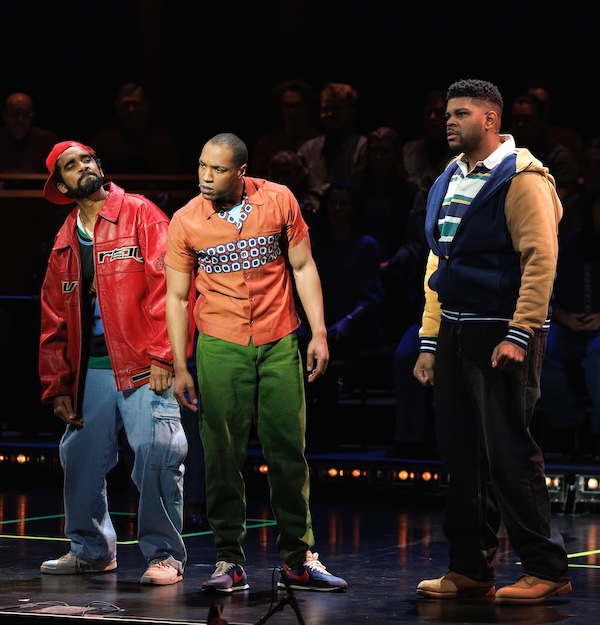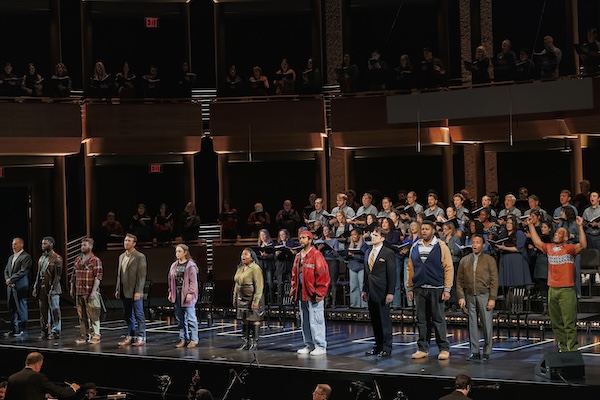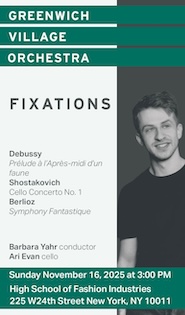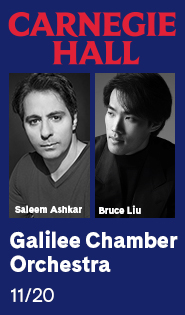MasterVoices’ “Blind Injustice” lifts up the wrongly convicted with eclectic music

There was a certain irony in the timing of Monday’s New York premiere by the choral group MasterVoices of Blind Injustice–a work for orchestra, soloists and chorus critiquing the U.S. criminal justice system.
On an evening in February 2025, it required some dialing back in time to remember when the worst thing anybody said about this country’s courts and prosecutors was that sometimes people were convicted of crimes they didn’t commit.
This opera by composer Scott Davenport Richards and librettist David Cote, based on the eponymous book by the former prosecutor Mark Godsey, had its genesis in cases pursued in recent years by the Ohio Innocence Project, a program of the University of Cincinnati College of Law. Premiered by the Cincinnati Opera in 2019, the show was mounted last year at Montclair State University before its Monday opening in the Rose Theater of Jazz at Lincoln Center.
As ably led on Monday by Ted Sperling with a 12-piece orchestra and a MasterVoices chamber chorus of 33 singers, the piece pleaded eloquently on behalf of six wrongly convicted Ohioans, telling the harrowing but ultimately upbeat stories of their arrests, trials, imprisonment, exoneration and successful return to society.
In character portraits and satirical scenes, Blind Injustice illustrated how the American legal ideals of evidence and scientific proof sometimes collide in the courts with prosecutorial careerism, prejudice and fear to produce unjust results.
With an approach that was more tell than show, the piece felt more like an oratorio than an opera. That impression was reinforced by Robin Guarino’s staging, with the principal characters lined up across the stage in chairs, awaiting their turn to sing.
While the piece had less courtroom reenactment than one might expect from its subject matter, there was welcome dramatization in moments such as the gunfight that led to the arrest of the “East Cleveland Three”—Derrick Wheatt, Laurese Glover and Eugene Johnson—and a chorus of schoolgirls denouncing bus driver Nancy Smith for molestation, in a scene reminiscent of The Crucible.
In David Meschter’s sound design, sung and spoken dialogue wove together seamlessly, and was generously amplified in the smallish jewel-box theater, making the projected supertitles almost unnecessary.
Richards’s pop-inflected score ranged from operatic—in a show-stopping aria by tenor Orson Van Gay II as the imprisoned Glover—to hip-hop, and from silky romance to jagged protest, all of it expertly paced and characterized by conductor Sperling and his band.
Joining Van Gay in strong performances as the Cleveland Three were baritone Phillip Bullock as Wheatt and bass-baritone Miles Wilson-Toliver as Johnson, the latter especially resonantly anchoring the trio.
Tenor Thomas Capobianco was in clear voice and deer-in-headlights look as the regular guy Clarence Elkins, convicted of rape and murder on the changeable testimony of his six-year-old niece. The true perpetrator of that crime, Earl Mann, eventually confessed to a prison cellmate, as enacted in Monday’s performance by Mark Kudisch and Joseph Parrish respectively.
Soprano Reilly Nelson appealed to heaven in soaring lines as the devout Christian bus driver Smith, accused (during a period of national hysteria over sexual crimes in daycare centers) of driving children to her boyfriend’s house to be abused.
Rickey Jackson’s 39 years in prison for murder—thought to be the Ohio record for a wrongly convicted inmate—would give a person plenty to sing about, and sing baritone Eric Shane Heatly did, with sarcastic diction at first, then more benevolently as his character discovered healing texts in the prison library.
Joshua Dennis as the Defense Attorney looked agreeably rumpled as costumed by Tracy Christensen, tieless in a sport coat, and he pled his case in a warm tenor. But of course he suffered the fate of all voice-of-reason characters in opera: eclipse by the villain. Bass-baritone Christian Pursell’s Prosecutor was all fury and inner conflict, his tight dark suit and briefcase fairly bursting with accusations as he resonantly defended his right to “do my job,” but ultimately confessed to doubts about what he had done.
Mezzo-soprano Briana Hunter was briefly eloquent as Wheatt’s mother, while the rich-toned soprano Victoria Okafor was a substantial presence onstage as Alesha, a law student speaking for the women of the black community, repeatedly confronting the Prosecutor over the loss of their husbands and sons.
When not imitating schoolgirls or donning white lab coats to portray “expert witnesses” at trial, the singers of the admirably blended and tuned MasterVoices chorus provided fierce protest or velvety background from their seats in the gallery above and behind the stage.
The lighting by Jason Flamos adroitly spotlighted the protagonists in turn and guided onlookers through what action there was, although one could have done without the crude device of pointing bright lights in the audience’s eyes at every climactic moment of the drama.
From photographs of the real-life personae of the story, one imagined that costume designer Christensen and hair and makeup designers J. Jared Janas and Cassie Williams need only have raided those people’s closets to dress this production so realistically.
Director and dramaturg Guarino and conductor Sperling brought this production in at a crisp 90 minutes or so, without intermission, which left time for a post-show conversation with the production team, principal performers, and even four of the actual exonorees just portrayed onstage. Approximately two-thirds of the audience stayed for the talk, something of a record in itself.
Blind Injustice will be repeated 7:30 p.m. Tuesday. mastervoices.org




